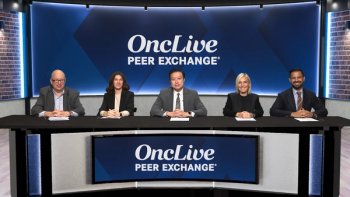
Panelists discuss treatment selection, resistance challenges, and future directions in managing BRAF-mutated lung cancer.

Your AI-Trained Oncology Knowledge Connection!


Julia Rotow, MD, is a physician, clinical director of the Lowe Center for Thoracic Oncology, and director of Clinical Research at Dana-Farber Cancer Institute, as well as an assistant professor of medicine at Harvard Medical School.

Panelists discuss treatment selection, resistance challenges, and future directions in managing BRAF-mutated lung cancer.

Panelists discuss the latest trial results supporting dual-pathway inhibition in BRAF-mutated metastatic lung cancer.

Drs Rotow and Woodard talk through recent updates to the perioperative non–small cell lung cancer treatment paradigm.

Panelists discuss combination targeted approaches for managing BRAF-mutated lung cancer and their impact on disease durability.

Panelists discuss evolving treatment approaches for BRAF-mutated metastatic lung cancer and their clinical impact.

Explore a case study on HER2 mutant lung cancer treatment, highlighting challenges, responses, and the importance of monitoring for ILD.

Panelists discuss the biology and clinical implications of BRAF mutations in non–small cell lung cancer (NSCLC).

Panelists discuss individualized treatment selection based on age, comorbidities, and patient preferences in ALK-positive lung cancer.

Explore a case study on HER2 mutant lung cancer treatment, highlighting challenges, responses, and the importance of monitoring for ILD.

Explore a case study on HER2 mutant lung cancer treatment, highlighting challenges, responses, and the importance of monitoring for ILD.

Panelists discuss novel research directions aimed at overcoming resistance and extending survival in ALK-positive lung cancer.

Panelists discuss mechanisms of acquired resistance to ALK inhibition and how molecular testing guides sequencing strategies.

Explore a case study on HER2 mutant lung cancer treatment, highlighting challenges and responses to chemotherapy and immunotherapy.

Explore a case study on HER2 mutant lung cancer treatment, highlighting challenges, responses, and the importance of monitoring for ILD.

Panelists discuss how real-world data complement clinical trials in understanding outcomes for ALK-positive lung cancer.

Panelists discuss how mature survival data inform treatment sequencing and maintenance strategies in ALK-positive lung cancer.

Explore a case study on HER2 mutant lung cancer treatment, highlighting challenges and responses to therapy in a patient with metastatic disease.

Explore innovative strategies for testing and treating HER2 alterations in non-small cell lung cancer through real-world case studies and expert insights.

Panelists discuss ongoing research and investigational strategies aimed at overcoming resistance in ROS1-driven lung cancer.

Panelists discuss translating clinical trial evidence on ROS1-targeted therapy into real-world patient management.

Panelists discuss the role of ALK rearrangements in lung cancer and the development of successive generations of targeted inhibitors.

Panelists discuss long-term data demonstrating the durability of response and intracranial protection achieved with modern ALK-targeted therapies.

Panelists discuss the molecular and clinical characteristics of ROS1-driven lung cancer and the role of precise molecular testing in guiding targeted therapy.

Panelists discuss first-line treatment strategies for ROS1-positive lung cancer and the factors influencing therapy selection and sequencing.
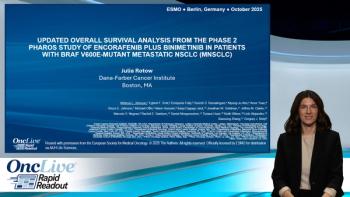
An expert discusses updated overall survival results from the phase 2 PHAROS study evaluating encorafenib plus binimetinib in patients with BRAF V600E–mutant metastatic non–small cell lung cancer (mNSCLC).
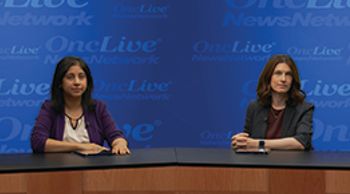
Julia Rotow, MD, and Jyoti Malhotra, MD, MPH, discuss unmet needs in advanced NSCLC.

Julia Rotow, MD, and Jyoti Malhotra, MD, MPH, discuss novel biomarkers under investigation in advanced NSCLC.

Julia Rotow, MD, and Jyoti Malhotra, MD, MPH, discuss the investigation of sigvotatug vedotin plus pembrolizumab in NSCLC.

Julia Rotow, MD, and Jyoti Malhotra, MD, MPH, discuss the investigation of sigvotatug vedotin in nonsquamous NSCLC.

Julia Rotow, MD, and Jyoti Malhotra, MD, MPH, discuss unmet needs in second-line non–small cell lung cancer.
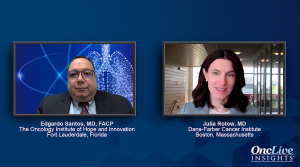
Published: March 17th 2025 | Updated:
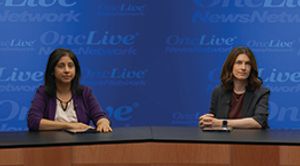
Published: September 22nd 2025 | Updated:
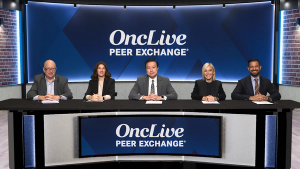
Published: November 5th 2025 | Updated:
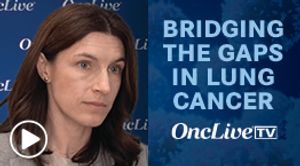
Published: July 25th 2024 | Updated:

Published: November 5th 2025 | Updated:

Published: March 17th 2025 | Updated: